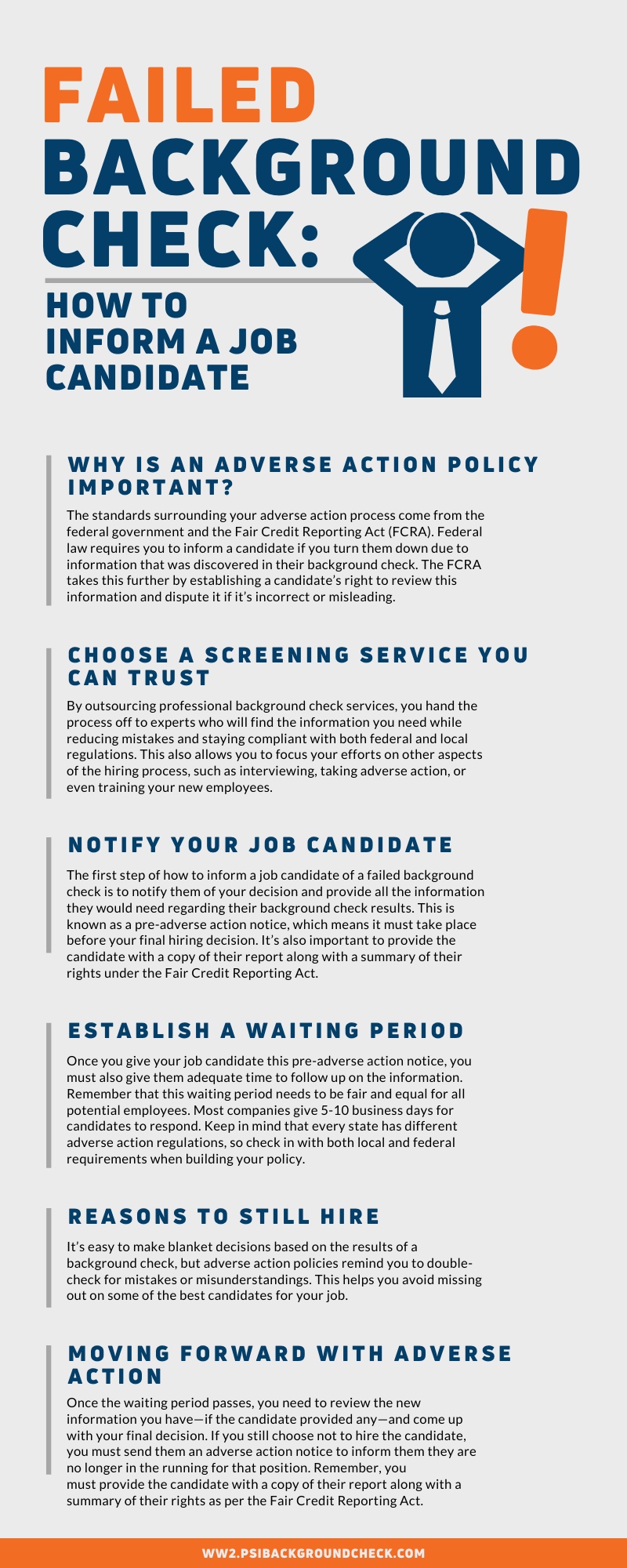
A solid hiring process is about more than just finding the perfect candidate for your company. The way you choose—or don’t choose—candidates can bring a lot of legal trouble for your business if you don’t follow certain procedures and regulations. This is why it’s important to establish a screening process that follows local and federal regulations to treat each potential hire fairly. You can’t just make snap judgments about candidates, even if something unfavorable turns up in their background check. If information from the screening process turns out to be a dealbreaker for your company, you must follow certain steps to keep your adverse action procedures legal and compliant. Most importantly, this includes informing the candidate of their background check results and giving them time to dispute or explain any negative information. A successful hiring and background screening policy can do wonders for your company, so make sure you have all the information you need to do it right. To help you along the way, here’s our guide on failed background checks and how to inform a job candidate.
Why Is an Adverse Action Policy Important?
In order to keep your business and its procedures compliant, it’s important to learn more about the regulations your business should adhere to. The standards surrounding your adverse action process come from the federal government and the Fair Credit Reporting Act (FCRA). Federal law requires you to inform a candidate if you turn them down due to information that was discovered in their background check. The FCRA takes this further by establishing a candidate’s right to review this information and dispute it if it’s incorrect or misleading. The FCRA also creates steps your company must follow when informing a candidate about your decision, including providing a summary of the report and your candidate’s consumer rights under the Fair Credit Reporting Act. In addition to these standards, you must also follow guidelines from the Equal Employment Opportunity Commission (EEOC). The EEOC’s standards help ensure your company treats each potential hire fairly, including those with criminal histories. Understanding these standards and the reasoning behind them is the key to making your hiring process and adverse action procedures the best they can possibly be. This will help create a reliable adverse action policy that you can look to when you need it.
Choose a Screening Service You Can Trust
Your hiring process—including any adverse action you may make—revolves around accurate results in the background check. While mistakes happen, you want to reduce the number of inaccuracies and errors as much as possible. By outsourcing professional background check services, you hand the process off to experts who will find the information you need while reducing mistakes and staying compliant with both federal and local regulations. This also allows you to focus your efforts on other aspects of the hiring process, such as interviewing, taking adverse action, or even training your new employees. PSI Background Screening makes the entire process more efficient so you can take the steps you need to either move on with your new candidate or continue the search for employees as quickly as possible.
Notify Your Job Candidate
The first step of how to inform a job candidate of a failed background check is to notify them of your decision and provide all the information they would need regarding their background check results. This is known as a pre-adverse action notice, which means it must take place before your final hiring decision. In addition to informing the candidate that you’re considering adverse action due to their background check results, you must provide a few extra documents, including:
- A summary of the candidate’s background check results
- A copy of the background check report
- Contact information for the background screening company that provided the results
- A copy of the candidate’s rights under the Fair Credit Reporting Act
- Your company’s contact information to dispute the results or otherwise follow up
It’s also important to provide the candidate with a copy of their report along with a summary of their rights under the Fair Credit Reporting Act. You can send all this information to the candidate by mail or by e-mail. Just remember that you have to take the same exact steps for every candidate you consider during your hiring process.
Establish a Waiting Period
Once you give your job candidate this pre-adverse action notice, you must also give them adequate time to follow up on the information. Remember that this waiting period needs to be fair and equal for all potential employees. Most companies give 5-10 business days for candidates to respond. Keep in mind that every state has different adverse action regulations, so check in with both local and federal requirements when building your policy. During this waiting period, you cannot throw out their application or move forward with a different candidate. Instead, you must wait for the entire period or until you receive their response.
Reasons to Still Hire
This waiting period doesn’t exist just to keep you legally compliant. It can also help you hire candidates you might have otherwise turned down. There could be many reasons why you should continue with a hiring decision even after the background check reveals negative information. For example, the background check might come up with inaccurate information due to data entry errors in the initial application. Your candidate might also have a reasonable explanation for something that shows up in their criminal background check. It’s easy to make blanket decisions based on the results of a background check, but adverse action policies remind you to double-check for mistakes or misunderstandings. This helps you avoid missing out on some of the best candidates for your job.
Moving Forward with Adverse Action
Once the waiting period passes, you need to review the new information you have—if the candidate provided any—and come up with your final decision. If you still choose not to hire the candidate, you must send them an adverse action notice to inform them they are no longer in the running for that position. Remember, you must provide the candidate with a copy of their report along with a summary of their rights as per the Fair Credit Reporting Act. In addition to written confirmation that you’re taking adverse action due to the background check results, your notice should include:
- Written confirmation that the employer is solely responsible for this decision
- Contact information for the company that provided the background check
- Notification of the candidate’s right to request another copy of their background report
- Another copy of the candidate’s rights under the Fair Credit Reporting Act
At the end of the day, every step of your adverse action procedure is a way to further guarantee your company treats every candidate fairly and equally. Once you have a solid policy in place, you can find the best hires for every job opening you have, allowing your business to grow safely and successfully for years to come.



